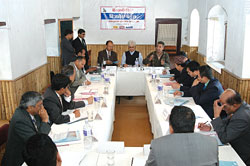 In the latest in its series of economic roundtables, Himalmedia's Business Bahas went in-depth into the banking sector on 10 March.
In the latest in its series of economic roundtables, Himalmedia's Business Bahas went in-depth into the banking sector on 10 March.
The banking sector is doing well despite the conflict, but it would do even better if the insurgency was resolved and investment opportunities expanded. Banking is a role model for other sectors of the economy because of proper regulatory mechanisms and transparency are in place.
Invited participants zeroed in on the challenges and prospects thrown up by the conflict. Will the short-term focus on consumer banking and remittances give way to bigger things? Speakers agreed this was only possible if the conflict is resolved.
 Radhesh Pant
Radhesh Pant
CEO, Bank of Kathmandu
. Nepal's banks are serving barely 15 percent of the population, and growth has been affected by the conflict. But despite this the banking sector has found ways to expand the market through consumer banking and remittances. Even tough investments may be down, profits have not dropped and part of the reason for that is transparency. Because of the tight regulation of the Nepal Rastra Bank, banks can't hide poor performance like other sectors.
. If it hadn't been for the conflict, the banks would now have had a network of channels right to the rural areas. We would have branches in village after village. The rural population would have access to loans and bank services would have expanded.
. On non-performing loans, the biggest problem is that big business buys off politicians (so they don't have to pay loans).
 Sudhir Khatri
Sudhir Khatri
CEO, Development Credit Bank
. I agree, banking is regulated and transparent. Proof of this is that in other sectors profits can be hidden and balance sheets show losses which is not reflected in the lavish lifestyles of so-called 'bankrupt' industries.
. If you want to open a commercial bank today, you need paid-up capital of Rs 1 billion, but how much capital does an industrialist need to open an industry? It's all bank loans.
. Because we haven't yet developed a 'corporate culture' I don't think there will be consolidation in the banking sector with mergers. Basel won't harm us, it will benefit banking. Nowhere else in South Asia except Nepal do you have 12 percent liquidity. We have already hit rock bottom, there is nowhere to go but up.
 Narendra Bhattarai
Narendra Bhattarai
Managing Director, NCC Bank
. Banks are only a small part of the entire economy. So banks can't be an island of normalcy when everything around is abnormal. Even so, the banking sector has a few good things going for it. Our economy is dominated by the informal sector and the banks have made inroads into it in the past 15 years. Insurgency-driven urbanisation has changed consumer patterns and lifestyles and the banks have benefited. Even in the midst of the conflict, banks did well because more Nepalis started migrating overseas for work and remittances grew. This entire conflict-driven cycle is factor in the growth of the banking sector. However, the overall situation is not good. The conflict has also affected business, villages are empty, and this hurts the national economy. The profit banks are reaping now is temporary.
. The reasons banks are doing well is because the informal economy is converting to formal, the growth of transparency and remittances. Besides, Nepal Bank Limited and Rastriya Banijya Bank have 40-50 percent market share and their reform in the past five years has had a ripple effect on other banks.
. After the banks entered the remittance business, the competition has brought down the cost of money transfers. And the Rastra Bank has a system where money from remittances are exchanged at a 15 paisa higher rate.
. After the conflict started, there has been no investments in large capital intensive industries. If the situation hadn't deteriorated there would have been big projects that would have needed financing. Such projects are still viable, but reluctance is due to the risk factor.
. The Rs 1 billion threshold for paid up capital is not logical. How much capital a bank wants is its business. We need to decide whether the Basel-2 deadline of January 2007 is desirable here or whether we need to adapt it for Nepali conditions.  Parsuram Kunwar
Parsuram Kunwar
Chief Administrator, Nepal Bank Limited
. Looking at the past five years of bank dividend rates, I would say the banks are not doing too well. Some banks may have done well, but overall the rate of dividends has gone down.
. No one know who in Nepal earns how much from where. If you look at company balance sheets, there is no salary dividend anywhere for the directors yet their lifestyles are disproportionately luxurious. This is why transparency is important.
. Even if it wasn't for the conflict, consumer banking would have come to Nepal. And it's not that there was no opportunity elsewhere so consumer banking grew. Even in India, banks that are doing well in other areas are attracted to consumer banking.
 Suman Joshi
Suman Joshi
CEO, Laxmi Bank
. Te main reason banks are on a sound footing is because of good governance and risk management in the past three-four years. Internally the banks have cleaned up their act. All this has helped.
. Because of the lack of transparency we don't know exactly how much profit companies in Nepal are making, but many are actually doing quite well. Even till five years ago, a middle-income Nepali family had to think twice before getting a home loan. Today, it is accepted practice. This brings a culture which requires a borrower to think about repaying loans, so they start working harder and productivity goes up. So it is a chain reaction that helps the economy in the long run. The banks have adapted to the abnormal situation and learnt to survive.
. It is too hypothetical to plan for 2010 when we don't know if we can resolve the conflict by then. If the insurgency is still going on then, would international banks want to come here? There will be no big infrastructure and no big projects. The problem is non-economic, unless that is resolved we can't look at the economic side of things and plan for them. We may make-do with remittances and consumer financing for a while but this won't be the long-term solution.
 Surendra Bhandari
Surendra Bhandari
CEO, Kumari Bank
. Despite the conflict there are trends in the economy that have indirectly helped the banking sector. They may be temporary benefits, but it's not as if the banks are going to go under. Investments in garments, carpets, hotels have dried up because of the conflict.
. In the old days, big debtors used their connections not to pay loans and the banks used to focus on smaller debtors. But the Rastra Bank is strict now, banks are forced to declare non-forming loans when a time limit is crossed and this can hit the bank's bottomline.  Surendraman Pradhan
Surendraman Pradhan
Chief, Banking Administration Division, Nepal Rastra Bank
. I agree that one factor in the strength of the banking sector is Rastra Bank regulations. Until you have cash collection you can't show it as income. It's not just for show.
. But the banks have indirectly benefited from the conflict, mainly because of rapid urbanisation. This has sent real estate prices soaring, and this has had an impact on property collaterals Customers are paying back their loans so the bank doesn't seize property and auction it.
 Basudevram Joshi
Basudevram Joshi
Banker, Nepal Rastra Bank
. Overall, the economy has shrunk by up to three percent. If this hadn't happened the economy would have expanded and there would be more capital mobility. So banks have nowhere to invest and are floating on high liquidity and this has kept interest rates low. In addition, there have been problems on loan repayment because of the conflict. For example the Rastriya Banijya Bank has Rs 1 billion invested in hotels. These loans can be repaid only if tourism bounces back, and for that we need the conflict resolved.
. Big debtors know how to use the court system and file a writ petition, the court easily issues a stay order. If you look at NBL and RBB, most of the bad loans are of this type. This can drag on indefinitely in the courts and the banks just have to sit back and wait twiddling their thumbs.
 Anil Shah
Anil Shah
CEO, Nabil Bank
. Bank now have to be accountable towards Nepali overseas workers because the money they send home is such a large part of our business. Banks have been forced to provide more reliable, more accessible and affordable money transfers. They have appointed sub-agents in villages so families can easily and safely collect transfers. In addition, workers have access to Rs 100,000 in loans at 8.5 percent interest if they want to go abroad to work.
. Now we want to tell them, why wait till you earn your money to buy a car or home? Why don't you build your house or buy a car before you go abroad. You can pay while you earn. We at Nabil have also allowed workers to open a special account, after all they are clear about two things: to work and to earn. They know very well which agency gives the best rate for money transfers home.
. At present the major business for banks are remittances and consumer banking. In the future it will be hydropower and physical infrastructure. Today, even if we wanted to invest in Upper Trisuli we'd need $50 million and we won't have enough money. That is why it is important for us to have big banks and this is possible only through mergers and acquisitions.


